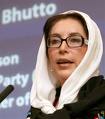Who killed Benazir Bhutto? The main suspects

The main suspects in Benazir Bhutto’s assassination are the Pakistani and foreign Islamist militants who saw her as a heretic and an American stooge and had repeatedly threatened to kill her.
But fingers will also be pointed at Inter-Services Intelligence, the agency that has had close ties to the Islamists since the 1970s and has been used by successive Pakistani leaders to suppress political opposition.
Ms Bhutto narrowly escaped an assassination attempt in October, when a suicide bomber killed about 140 people at a rally in the port city of Karachi to welcome her back from eight years in exile.
Earlier that month, two militant warlords based in Pakistan’s lawless northwestern areas, near the border with Afghanistan, had threatened to kill her on her return.
One was Baitullah Mehsud, a top commander fighting the Pakistani army in the tribal region of South Waziristan. He has close ties to al Qaeda and the Afghan Taleban.
The other was Haji Omar, the “amir” or leader of the Pakistani Taleban, who is also from South Waziristan and fought against the Soviets with the Mujahideen in Afghanistan.
After that attack Ms Bhutto revealed that she had received a letter signed by a person who claimed to be a friend of al Qaeda and Osama bin Laden threatening to slaughter her like a goat.
She accused Pakistani authorities of not providing her with sufficient security and hinted that they may have been complicit in the bomb attack. Asif Ali Zardari, her husband, directly accused the ISI of being involved in that attempt on her life.
Mrs Bhutto stopped short of blaming the Government directly, saying that she had more to fear from unidentified members of a power structure that she described as allies of the “forces of militancy”.
Analysts say that President Musharraf himself is unlikely to have ordered her assassination, but that elements of the army and intelligence service would have stood to lose money and power if she had become Prime Minister.
The ISI, in particular, includes some Islamists who became radicalised while running the American-funded campaign against the Soviets in Afghanistan and remained fiercely opposed to Ms Bhutto on principle.
Saudi Arabia, which has strong influence in Pakistan, is also thought to frown on Ms Bhutto as being too secular and Westernised and to favour Nawaz Sharif, another former Prime Minister.

